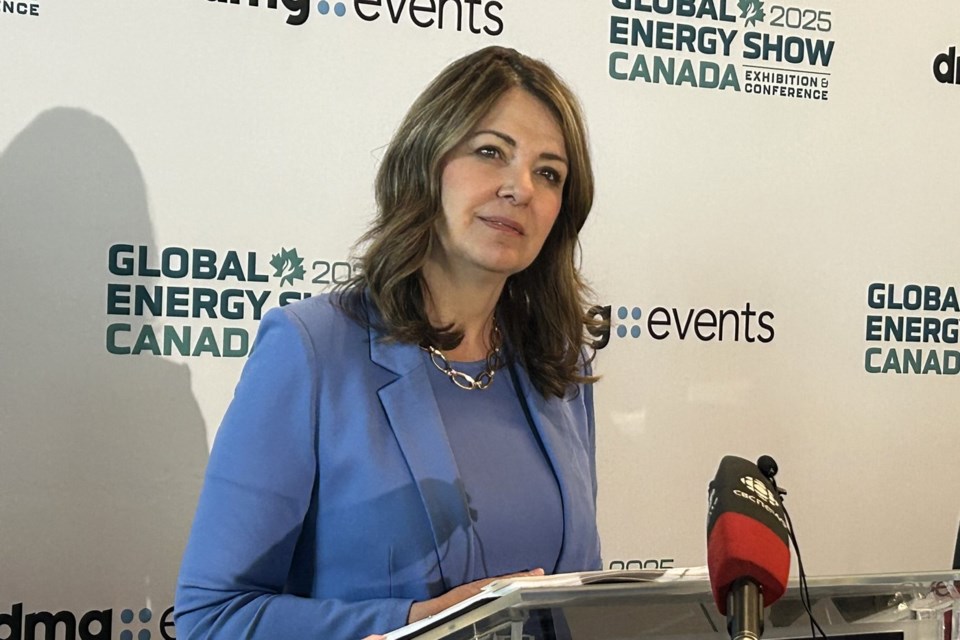CALGARY — The Alberta government is working to entice a private-sector player to build a major crude pipeline to coastal waters, Premier Danielle Smith said Wednesday.
"We're talking to all of the pipeline proponents; anyone who has had success in building a pipeline in Canada and has an interest in perhaps coming together as a consortium. Or, if one emerges as being a principal proponent, then we'll be interested in talking to them, too," Smith told reporters following a speech to the Global Energy Show.
"But we know that it's a chicken and egg problem, that no one's going to come forward with a project without some guarantee that it is going to be approved."
Alberta could help the project along by committing barrels of physical bitumen received in lieu of cash royalties from oilsands producers, Smith said.
She has been enthusiastic about reviving a plan to ship oilsands crude to the northern B.C. coast for export to Asia, and the end point she sees making the most sense is Prince Rupert, B.C.
Enbridge Inc. had once planned to ship crude to another northern B.C. port, Kitimat, via its proposed Northern Gateway pipeline. That project was nixed in 2016 when the federal government banned tankers off the northern B.C. coast.
Enbridge CEO Greg Ebel has said it would take a major overhaul in federal regulations for his company to revisit such a proposal.
Smith said Prince Rupert might be a more viable choice than Kitimat, as it has a less treacherous route out to the open Pacific and many other commodities already move out of there.
Smith said no company will agree to build a pipeline to the northern B.C. coast as long as there is a tanker ban, and oilsands companies aren't going to expand their production as long as there's a federal emissions cap.
The premier urged conference attendees to keep up the pressure on Prime Minister Mark Carney's government to do what needs to be done to get "nation-building" projects built.
"Anything less than success means failing to act for Canada. It means failing to stand up for democracy and peaceful global development," she said.
"And most importantly, it means a loss of economic prosperity that future Canadian youth and families cannot count on to enhance their standard of living locally and to eliminate energy poverty globally."
With U.S. President Donald Trump's tariffs throwing the Canada-U.S. trade relationship into disarray, there have been growing calls for Canada to tap into other markets for its resources.
The only way meaningful amounts of Canadian oil can currently flow to customers outside the United States is via the federally owned Trans Mountain pipeline to the B.C. Lower Mainland, whose expansion started up about a year ago.
Trans Mountain CEO Mark Maki told reporters on the sidelines of the conference that his is among the companies Smith has talked to about spearheading a new pipeline.
"But as far as us ... optimize the existing kit is the first priority," he said.
The Trans Mountain pipeline has been running at about 85 per cent of its capacity of 890,000 barrels a day. That could be taken further to 1.14 million barrels a day with the help of drag-reducing chemical additives and additional pumping horsepower.
Maki said Carney, a former central banker, strikes him as a decisive and detail-oriented leader who "gets it."
"The business sort of wiring to him, I think is where a lot of my optimism comes from," he said.
Carney recently met with provincial and territorial premiers to hear about what projects they'd like to see fast-tracked under new legislation, but has not said which have made the cut.
Smith said she'll give the Liberals until the fall legislative session — or four to six months — to determine whether Carney is serious about his pledge to make Canada an "energy superpower."
Smith is also keen on accessing global markets via the East Coast or a pipeline to the Port of Churchill in northern Manitoba, which would give tanker access to Hudson Bay.
Smith heaped praise on Manitoba Premier Wab Kinew — a New Democrat of a much different political stripe than her United Conservative Party — for being open to that idea.
"He has been very vocal in saying that he wants Churchill to be a major export hub, including oil and gas, and he's been unequivocal about that," Smith said.
B.C. NDP Premier David Eby, on the other hand, has been skeptical about pursuing a Northern Gateway-like proposal while Trans Mountain, already in operation, is running under full capacity and has expansion potential.
Smith did not appear deterred. In an onstage interview with former CBC anchor Peter Mansbridge at the conference, she said with a chuckle: "I'll convince David Eby."
This report by The Canadian Press was first published June 11, 2025.
Lauren Krugel, The Canadian Press




